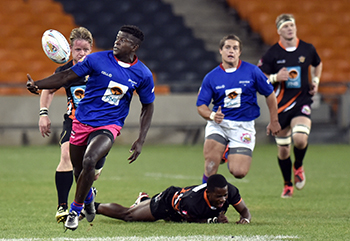Latest News Archive
Please select Category, Year, and then Month to display items
02 January 2025
|
Story Gerda-Marie van Rooyen
|
Photo Supplied
 Leading the research in South Africa is Prof Linus Franke from the Department of Soil, Crop and Climate Sciences.
Leading the research in South Africa is Prof Linus Franke from the Department of Soil, Crop and Climate Sciences.
Scientists are actively pursuing the successful breeding of diploid hybrid potatoes from inbred lines. This is expected to revolutionise potato breeding as it holds the key to rapid genetic progress. It will introduce new varieties for commercialisation through seed. Currently, existing potato variants have a gene that renders self-pollinated seeds infertile.
Prof Linus Franke, an academic in the Department of Soil, Crop and Climate Sciences at the UFS, is leading the research in South Africa. “This technology allows the production of genetically uniform potato seed that is easy to transport and largely disease-free.” He says this differs from conventional breeding whereby only vegetative propagation is possible due to tetraploid varieties in potatoes. It also risks carrying pests and diseases from one generation to the next – leading to the accumulation of pests and diseases with each round of multiplication.
Seed innovation
Prof Franke explains that Solynta BV, a seed company based in the Netherlands that produces potato varieties that can be grown from seed, has included South Africa in their research efforts because it is one of Africa’s largest producers and exporters. Through his academic relationship with Wageningen University and Research, a Dutch institution renowned for its agricultural endeavours and food production, the UFS became involved in researching hybrid potatoes grown from seed.
Diploid seeds containing two sets of chromosomes allow easier gene manipulation to increase predictability and speedier genetic progress. The breeding approach enables the incorporation of tolerance to pests, diseases, abiotic stresses (cold, heat, drought) and other desired genetic traits.
Although Prof Franke is optimistic about this research, he is not blind to disadvantages. “Potato seeds are tiny and have little energy reserves, making it harder to grow potatoes from seed than from tubers.” He says potatoes from seed will take longer to cultivate than tubers, as farmers need to grow plantlets from seeds first, adding six weeks to the growing period. “It is possible that commercial farmers can grow potatoes directly from seed. Alternatively, perhaps more likely, specialised growers will produce tubers of potatoes from seed; these tubers are then sold as seed tubers to other potato farmers, who then continue their normal practices of producing potatoes for the market from tubers.”
Financial benefits
Prof Franke says farmers have reason to get excited. “Seed potatoes will reduce input costs, as varieties with enhanced tolerance to pests and diseases require less pesticides. Planting one hectare of potatoes requires three to four tonnes of potato tubers, but only one 25 g packet of potato seeds.” Since potatoes are a more valuable commodity than maize, this technology might also increase farmers’ income potential.
Mafuma aims at elusive tournament victory with Junior Springboks
2016-06-03

The University of the Free State’s Mosolwa Mafuma
recently scored five tries in the Junior Springboks’
three practice matches against a Golden Lions U20
invitation team, a Maties team, and the
South Western Districts. Photo: SASPA
He has never won a rugby tournament, so Mosolwa Mafuma has only one goal: to win the Junior World Cup as Junior Springbok in England.
Even though the 20-year-old Shimlas wing has achieved success, and it is pleasing to excel individually, he believes it is more satisfying when his team triumphs. According to Mafuma, who could just as well be an athletics star, he wants to help the South African U20 team take a different approach.
He and the prop Kwenzo Blose are players from the University of the Free State who will represent the Junior Springboks from 7 to 25 June 2016 in Manchester. The team will play the first of three group matches on 7 June 2016 against Japan in the Academy Stadium.
New approach for SA U20 team
Mafuma, who was Player of the Tournament in his first Varsity Cup in 2016, says the Junior Springboks are well prepared. “We have the skills, and the structures at the Junior Springboks are different than before. There is not just one game plan like playing with big guys. We want to try new things and have a different approach.”
It is with this team that he wishes to achieve something. “It is one thing to be able to say that you are the Player of a Tournament, but your team did not win. I have not won something at school (with St. Benedict’s Boys College in Johannesburg) or this year with the Shimlas.”
Speedster on athletics track
The speedster is one of only a few rugby players who also have a profile on the IAAF website. His fastest time in the 100 m is 10.37 seconds (a national U17 record) and 20.37 s in the 200 m.
In high school, this first-year Psychology student played rugby during winter and took part in athletics during summer. Only at the end of Grade 11 did he started focusing on rugby. “I was more of an athlete than a rugby player,” he says.
It is no coincidence that the nickname he acquired due to his speed, is Dash. His other nickname, Senkie (derived from the Afrikaans word ‘seuntjie’) he received as a child from his parents because he was such a small child.